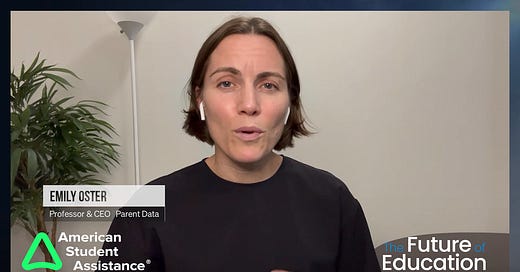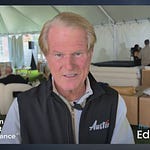Emily Oster, professor, author, and CEO of ParentData, joins Michael and Jean to share which information she thinks is most valuable in selecting a career. She advises career explorers to get a good understanding of what a person in a particular job does from day to day and offers a range of ways to gather this crucial data.
Jean Eddy:
Today, we're delighted to have Emily Oster join us. Emily is an economist who is a professor at Brown University. She's the founder of Parent Data, which is a data-driven guide from pregnancy to parenthood and beyond with hundreds of helpful articles. Emily hosts podcasts, including her latest, Raising Parents with Emily Oster. And she’s a best selling author with four books to her name. Expecting Better, Cribsheet, The Family Firm and The Unexpected.
This is going to be a fun one, Michael.
Michael Horn:
No doubt, Jean. And whenever I get to talk to Emily, I feel like I learn something new. It helps me reframe things. And so, Emily, welcome. It is so good to see you, and I am dying to ask you this question:
We can find data in lots of different places and lots of different forms. Data obviously is your specialty and passion. So for those advising kids on learning about, exploring and ultimately pursuing careers, what are the data or the signals that you recommend they pay attention to? Is there a process you recommend to help them learn about the fast changing world of careers?
Emily Oster:
Hi, Jean and Michael, thank you so much for having me. I think the most important piece of data or information that our kids need to collect to think about what kind of jobs they might want are, what do you do every day at that job? When we give advice to kids, we tend to talk in generalities. What kind of education do you need for that job? What kind of income does that job make? What kind of people do this job? What does it look like in a sort of general sense?
But when you experience a job, what you’re experiencing is the job, doing the things that you do every single day. And without knowing what that's like, it's actually really difficult to consider what kind of job you want to have. So when I talk to kids or when you talk to kids about how they think about their job options, I'd really encourage them to try the job. And I encourage this for little kids, for medium-sized kids, for older kids. When I talk to my graduate students about what kind of job they want, I say, hey, you should try doing that job. Do that job for the summer, do that job for a year. Think about, do you actually like being there?
Because ultimately what you want to have in your career is a job where you look forward to going to it most days. Nobody looks forward to going every day. But you want to have a job where most of the days you enjoy what you're doing day to day.
From the standpoint of advice to middle school and high school kids, there's a lot of ways they can actually learn about jobs. One is internships. Another is even spending a day or two at an office or at a work site, or in some way engaging with what do people who do this job every day do? And if all they can do is talk to people, at least try talking to people. Not about how did you get to where you are. Not about what kind of money do you make, but really about what do you do every day, because that's the piece of data you need to know to figure out if this job is right for you.
Jean Eddy:
And that's all we've got on the Youth Career Readiness, the One Question podcast.
Michael Horn:
Thank you for tuning in, and we'll see you next time for more tips and and insights.
















Share this post